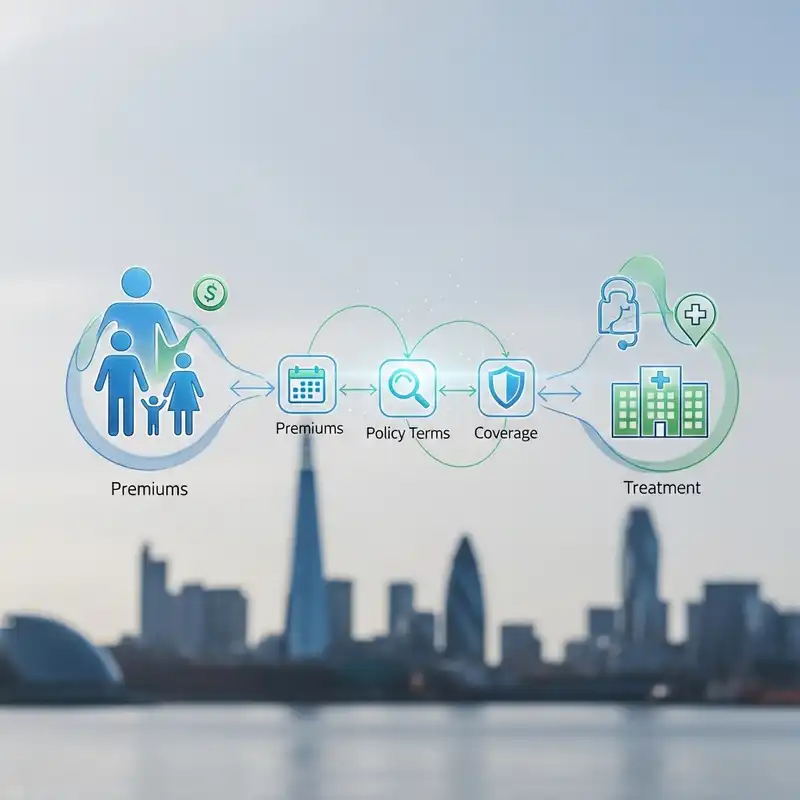TL;DR
Navigating this landscape can feel overwhelming, so let's summarise the optimal strategy for most UK families. By purchasing your private health or life insurance through us, you may also be eligible for discounts on other types of cover, creating a comprehensive protection plan for your growing family.
Key takeaways
- Accept the Reality: Do not expect a standard PMI policy to pay for your dream private birth. It is not designed for this purpose.
- Plan for the Birth (illustrative): If you desire a private birth, the most realistic and common path is to self-fund. Start researching hospitals and saving early. A budget of £20,000 to £40,000 is a realistic target.
- Insure for the Unexpected: This is where a robust private medical insurance policy is non-negotiable. Choose a comprehensive plan that explicitly covers a wide range of pregnancy and childbirth complications. This is your safety net for serious, unforeseen issues.
- Protect Your Newborn: Ensure your chosen policy allows you to easily add your baby after birth. This gives you fast access to the best paediatric care should they need it.
- Use an Expert Broker: The difference between policies regarding maternity complications and newborn benefits can be subtle but significant. An independent broker like WeCovr can analyse the entire market, compare the complex policy wording, and find the best PMI provider for your specific needs. Our advice is impartial and comes at no cost to you.
WeCovr explores your options for private pregnancy and childbirth cover
Welcoming a new life is one of life’s most profound experiences. As an FCA-authorised broker that has helped arrange over 900,000 policies, WeCovr understands that expectant parents in the UK want the best possible start for their families. This often leads to questions about private medical insurance and its role in maternity care.
While the NHS provides excellent, world-class maternity services free at the point of use, many people explore private options for greater choice, comfort, and continuity of care. However, navigating the world of private health insurance for pregnancy can be complex. In this definitive guide, we will demystify your options, explain what is and isn't typically covered, and show you how to plan effectively for your family's future health.
Why Consider Private Maternity Care in the UK?
The UK's National Health Service safely delivers hundreds of thousands of babies each year. According to the Office for National Statistics (ONS), there were over 605,000 live births in England and Wales in 2023. The vast majority of these were under NHS care.
So, why do some families choose to go private? The decision is rarely about the quality of medical care, but rather the overall experience and environment.
Key benefits often cited for choosing private maternity care include:
- Consultant-Led Care: You can choose your specific obstetrician who will oversee your entire pregnancy journey, from the initial scans to the delivery and postnatal checks. This continuity of care is highly valued.
- Private, Comfortable Facilities: Private hospitals offer private en-suite rooms, often with amenities resembling a high-end hotel. This includes better food, flexible visiting hours, and a guaranteed private space for you and your partner to bond with your newborn.
- Increased Choice and Control: You have more say over your birth plan, including the option for an elective caesarean section, which may not always be available on the NHS without a specific medical reason.
- Longer Appointments: Private consultations are often longer, giving you more time to discuss your concerns and preferences with your consultant.
- Enhanced Postnatal Support: Many private packages include extended postnatal stays and access to lactation consultants and other support services.
While the NHS is a national treasure, it operates under significant pressure. This can sometimes mean busy wards, less choice over your doctor, and shorter appointment times. For those who can afford it, the private route offers a more personalised and serene experience.
The Crucial Truth: Does Standard PMI Cover Maternity?
This is the single most important question, and the answer often surprises people.
In short: a standard UK private medical insurance (PMI) policy does NOT cover routine pregnancy and childbirth.
To understand why, you need to understand the fundamental purpose of private health cover in the UK.
- PMI is for Acute Conditions: Health insurance is designed to cover the diagnosis and treatment of acute conditions. An acute condition is a disease, illness, or injury that is likely to respond quickly to treatment and lead to a full recovery.
- Pregnancy is Not an 'Unforeseen' Condition: Pregnancy is a natural life event, not an unexpected illness. Insurers view it as a planned event rather than an insurable risk in the same way they would view a sudden need for a knee replacement or heart surgery.
- Pre-existing and Chronic Conditions: All UK PMI policies exclude pre-existing conditions (ailments you already have when you take out the policy). As pregnancy is a known state, it falls under this principle. Standard PMI also does not cover the management of chronic conditions, which are long-term illnesses that require ongoing management rather than a cure.
Therefore, you cannot simply take out a health insurance policy when you discover you are pregnant and expect it to pay for a private birth. The costs are predictable and substantial, and pricing them into a standard policy would make premiums prohibitively expensive for everyone.
Your Real Options for Private Maternity Care
So, if your standard policy won't cover it, how can you access private pregnancy care? There are three primary pathways.
Option 1: Self-Funding Your Private Birth (The Most Common Route)
The vast majority of people who have a private birth in the UK pay for it directly out of their own pocket. This "self-pay" or "self-funding" model involves choosing a hospital and consultant and paying for a package of care.
The costs are significant and can vary widely based on the hospital, the location (London is most expensive), and the type of delivery. It's vital to get a clear quote upfront that details exactly what is included.
Estimated Costs for a Private Birth in the UK (2025)
| Service / Item | Consultant-Led Delivery (Vaginal) | Consultant-Led Delivery (C-Section) | Notes |
|---|---|---|---|
| Consultant Fees | £6,000 - £9,000 | £7,000 - £10,000 | Covers antenatal care, delivery & postnatal visit. |
| Hospital Fees | £7,000 - £15,000 | £9,000 - £18,000 | Includes delivery suite, room, nursing care, meals. |
| Anaesthetist Fees | £1,500 - £2,500 | £1,800 - £3,000 | Required for epidural or C-section spinal block. |
| Scans & Tests | £1,000 - £3,000 | £1,000 - £3,000 | Includes dating scan, anomaly scan, blood tests. |
| Paediatrician Check | £300 - £600 | £300 - £600 | For the newborn baby after birth. |
| Potential Extras | £1,000 - £5,000+ | £2,000 - £7,000+ | Extra nights, intensive care, blood transfusions. |
| Total Estimated Cost | £15,800 - £35,100 | £19,100 - £41,600+ | These are estimates; top London hospitals can be higher. |
Disclaimer: These are illustrative costs for 2025 and should be verified directly with hospitals like The Portland, The Lindo Wing, or The Kensington Wing.
Option 2: Specialist or International Health Insurance
While standard UK PMI excludes maternity, some very high-end domestic policies or international health insurance plans do offer a maternity benefit.
However, these plans come with crucial caveats:
- Long Waiting Periods: You cannot buy the policy and claim immediately. These policies have a "maternity waiting period" or "moratorium" of typically 10 to 24 months. This means you must have had the policy in force for almost two years before you can claim for maternity costs. You must plan years in advance.
- High Premiums: Policies that include comprehensive maternity cover are significantly more expensive than standard PMI, often costing several hundred pounds per month.
- Benefit Limits (illustrative): Even when cover is included, it is almost always capped at a certain amount (e.g., £10,000 or £15,000). This may not cover the full cost of a private birth at a top London hospital, leaving you with a shortfall to pay.
These policies are most common among expatriates or those covered by generous corporate schemes. For the average UK consumer, they are often not a cost-effective way to fund a private birth compared to self-funding.
Option 3: Using PMI for Complications of Pregnancy
This is where private medical insurance UK can be incredibly valuable for expectant parents. While your policy won't cover the routine journey of pregnancy and birth, many mid-range and comprehensive policies will cover unforeseen medical complications that arise during pregnancy or childbirth.
This provides a powerful safety net, giving you fast access to private specialist care should something unexpected and serious occur.
What Complications Might Your PMI Policy Cover?
The specifics vary hugely between insurers, which is why working with an expert PMI broker like WeCovr is so important to check the small print.
| Potentially Covered by PMI (as an Acute Condition) | Typically Not Covered by PMI (as part of routine pregnancy) |
|---|---|
| Ectopic pregnancy (requiring surgical intervention) | Routine antenatal appointments and check-ups |
| Miscarriage (requiring medical or surgical management) | Morning sickness |
| Molar pregnancy | Routine blood tests and scans |
| Severe Pre-eclampsia (requiring hospitalisation) | Antenatal classes |
| Gestational diabetes (if it requires acute inpatient treatment) | The planned delivery itself (vaginal or C-section) |
| Retained placenta (requiring surgical removal) | Postnatal check-ups |
| Post-partum haemorrhage (requiring emergency treatment) | Pain relief during a normal labour |
Having cover for these complications means that if the worst happens, you can be treated in a private hospital by a specialist of your choice, without delay. This peace of mind is invaluable.
Comparing How Top Insurers Approach Maternity Complications
When choosing a policy, you need to look carefully at the "Maternity" section of the policy documents. Here's what to look for from the leading UK providers.
| Provider | Typical Approach to Maternity Complications | Newborn Cash Benefit | Key Considerations |
|---|---|---|---|
| AXA Health | Often provide cover for a range of specified pregnancy and childbirth complications on their comprehensive plans. | Yes, typically offer a cash benefit per baby. | Check the specific list of covered complications. |
| Bupa | Generally cover complications, but the scope can depend on the policy level. Their top-tier plans have more extensive cover. | Yes, a 'parent and baby' cash benefit is common. | Bupa has its own network of hospitals and facilities. |
| Aviva | Cover for complications is usually available on their 'Healthier Solutions' policy. They often have clear definitions. | Yes, a baby bonus or cash benefit is usually included. | Check for any specific waiting periods for these benefits. |
| Vitality | Known for their wellness-based approach, they provide cover for serious pregnancy complications on most plans. | Yes, a cash payment is a standard benefit. | Their cover is often linked to engaging with their wellness programme. |
Expert Tip from WeCovr: Don't just look at the brand name. The level of cover is determined by the specific policy you choose. A basic policy from a top provider may offer no complications cover, while a comprehensive plan from a smaller insurer might. We can compare the intricate details across the market for you, at no extra cost.
Planning for Your Family: PMI for Your Newborn
One of the most valuable and straightforward benefits of private health insurance for new families is cover for the baby.
Most insurers allow you to add your newborn to your policy, often without any additional medical underwriting, provided you do so within a certain timeframe (usually 30 to 90 days after birth).
Why add your baby to your PMI policy?
- Immediate Access to Paediatricians: If your baby develops a new, acute condition (like severe reflux, hernias, or recurring infections), you can get a fast-track referral to a private paediatric specialist.
- Choice of Hospitals: You can choose to have your child treated in a private hospital or a private wing of an NHS hospital, ensuring a comfortable and calm environment.
- Cover for Minor Surgery: Common procedures required by newborns, such as tongue-tie division or hernia repair, can be covered.
- Peace of Mind: Knowing you have a back-up to the NHS for any non-emergency but worrying health issues can significantly reduce parental anxiety.
Newborn Cash Benefit
This is a popular feature of many private health cover plans. Insurers provide a small, tax-free lump sum payment for each child born or adopted.
- Typical Amount (illustrative): £100 - £250 per baby.
- Purpose: It's a goodwill gesture to help with the initial costs of a new baby.
- Condition: You typically need to have held the policy for a minimum period (e.g., 10 months) before you can claim.
A Holistic Approach: Health and Wellness During Pregnancy
While insurance provides a financial safety net, your health during pregnancy is paramount. A healthy pregnancy reduces the risk of complications and lays the foundation for a healthy baby.
Nutrition and Diet:
- Folic Acid: Crucial for preventing neural tube defects. The NHS recommends taking a 400 microgram supplement daily before you're pregnant and until you're 12 weeks pregnant.
- Iron: Your body needs extra iron to make more blood for you and your baby. Good sources include lean meat, leafy green vegetables, and fortified cereals.
- Vitamin D: Essential for bone health. A daily 10 microgram supplement is recommended throughout pregnancy and while breastfeeding.
- Foods to Avoid: Be sure to follow NHS guidance on avoiding certain foods, such as unpasteurised cheeses, raw or undercooked meat, and some types of fish high in mercury.
As a WeCovr client, you get complimentary access to our AI-powered nutrition app, CalorieHero, which can help you track your intake and make healthy choices throughout your pregnancy journey.
Staying Active:
Gentle, regular exercise is beneficial for most pregnant women. It can help manage weight gain, improve mood, and build stamina for labour.
- Safe Activities: Brisk walking, swimming, aquanatal classes, and prenatal yoga are excellent choices.
- Listen to Your Body: Avoid strenuous exercise, contact sports, and activities with a risk of falling. Always consult your midwife or doctor before starting a new exercise regime.
Mental Wellbeing:
Pregnancy is an emotional time. It's normal to feel a mix of excitement and anxiety.
- Talk About It: Share your feelings with your partner, friends, or family.
- Seek Support: Antenatal classes are a great way to meet other expectant parents. If you are struggling, speak to your midwife or GP. Mental health support is a vital part of maternity care.
- Rest: Ensure you get enough sleep. Your body is doing an incredible amount of work.
WeCovr's Expert Summary: A Strategic Plan for Your Family's Health
Navigating this landscape can feel overwhelming, so let's summarise the optimal strategy for most UK families.
- Accept the Reality: Do not expect a standard PMI policy to pay for your dream private birth. It is not designed for this purpose.
- Plan for the Birth (illustrative): If you desire a private birth, the most realistic and common path is to self-fund. Start researching hospitals and saving early. A budget of £20,000 to £40,000 is a realistic target.
- Insure for the Unexpected: This is where a robust private medical insurance policy is non-negotiable. Choose a comprehensive plan that explicitly covers a wide range of pregnancy and childbirth complications. This is your safety net for serious, unforeseen issues.
- Protect Your Newborn: Ensure your chosen policy allows you to easily add your baby after birth. This gives you fast access to the best paediatric care should they need it.
- Use an Expert Broker: The difference between policies regarding maternity complications and newborn benefits can be subtle but significant. An independent broker like WeCovr can analyse the entire market, compare the complex policy wording, and find the best PMI provider for your specific needs. Our advice is impartial and comes at no cost to you.
By purchasing your private health or life insurance through us, you may also be eligible for discounts on other types of cover, creating a comprehensive protection plan for your growing family.
Frequently Asked Questions (FAQs)
1. Does private health insurance cover childbirth in the UK? Generally, no. Standard private medical insurance in the UK does not cover routine, planned childbirth (either vaginal or caesarean). It is designed to cover unforeseen, acute medical conditions, and pregnancy is considered a planned life event. The most common way to have a private birth is to pay for it yourself (self-funding).
2. How much does it cost to have a baby privately in the UK? The cost varies significantly but typically ranges from £15,000 to over £40,000. A comprehensive quote for a consultant-led delivery package in a major London hospital in 2025 would likely be in the £20,000-£35,000 range, but this can increase if there are complications or an extended hospital stay is required.
3. Can I get health insurance if I am already pregnant? Yes, you can still take out a private health insurance policy while pregnant. However, that policy will not cover anything related to your current pregnancy, including antenatal care, the birth, or any complications that arise. It would, however, cover you for other new, acute medical conditions unrelated to your pregnancy.
4. What specific pregnancy complications might be covered by PMI? While policies vary, many comprehensive plans may offer cover for serious, acute complications of pregnancy. Examples include the treatment of an ectopic pregnancy, surgical management following a miscarriage, severe pre-eclampsia requiring hospitalisation, or treatment for a post-partum haemorrhage. It is essential to check the specific list of covered conditions in your policy documents.
Take the Next Step with WeCovr
Planning for a family is the perfect time to review your health protection. While standard PMI may not cover the birth itself, it provides an essential safety net for complications and invaluable cover for your new baby.
The UK private health insurance market is complex, but you don't have to navigate it alone. The expert advisors at WeCovr, with high customer satisfaction ratings, can guide you through every step. We compare plans from all leading insurers to find the right cover for your family's unique needs and budget.
Contact WeCovr today for a free, no-obligation quote and let us help you build the perfect health and wellness plan for your growing family.
Sources
- NHS England: Waiting times and referral-to-treatment statistics.
- Office for National Statistics (ONS): Health, mortality, and workforce data.
- NICE: Clinical guidance and technology appraisals.
- Care Quality Commission (CQC): Provider quality and inspection reports.
- UK Health Security Agency (UKHSA): Public health surveillance reports.
- Association of British Insurers (ABI): Health and protection market publications.

































